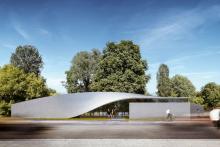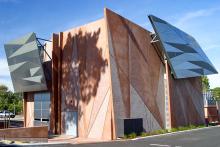Construction is underway in Germany on what is claimed to be the world's first building made entirely of carbon-fibre reinforced concrete.
The material that is being used on the project at the Technical University of Dresden is said by the building's architect HENN to enable more durable structures that can save up to 50% in CO2 emissions.

The 220m² experimental building combines laboratory and event rooms and forms a centre for the students on campus.
The Dresden building is a showcase initiative of the research project on innovative building materials "C³ - Carbon Concrete Composite", financed by the German Federal Ministry of Education and Research.
In this project, carbon concrete is being researched and developed as a new combination of carbon and high-performance concrete.
The light but robust carbon fibres of the new materials allow for flexible and resource-saving construction. HENN says the conversion to this material can reduce CO2 emissions from construction up to 50%.
"Besides the technical achievements, the design is of central importance," the company said.
"The design reinterprets the textile nature of carbon fibres through the fluid merging of ceiling and walls in a single form, suggesting a future architecture where environmentally conscious design is paired with formal freedom and radical rethinking of the most basic architectural elements.
"Wall and ceiling are no longer separate elements but functionally merge into one another as an organic continuum. The roof is opened by a skylight, which additionally emphasises the organic form."





